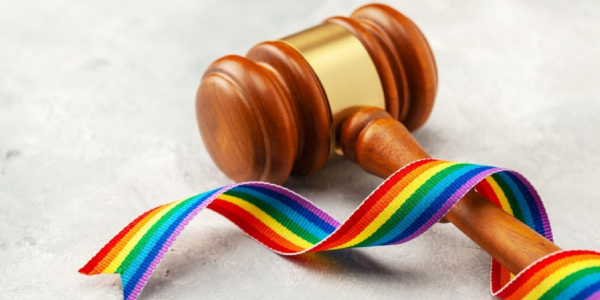Legal provisions governing LGBTQ+ Rights:
- Is consensual gay sex legal in India? – Yes, since 2018, after the Supreme Court of India decriminalized part of Section 377 of IPC in the landmark Judgment- Navtej Singh Johar v. Union of India, 2018.
- Is same-sex marriage recognized in India? – No.
- Are same-sex relationships such as civil unions recognized in India? – No.
- Are Transgenders legally recognized by their gender identity? – Yes, after the Supreme Court’s NALSA Judgment of 2014 (refer to the blog on the TP Act 2019).
- Are overseas same-sex marriages/unions legally recognized in India? – No.
- Are LGBTQ+ individuals able to inherit the property of the same-sex partner? No.
- Can LGBTQ+ employees be covered by in-house benefits, policy safeguards, grievance redressal mechanism? – Yes.
- Can LGBTQ+ individuals make decisions on behalf of their partner who is incapacitated? – No.
- Do same-sex couples have adoption rights? – No.
Some Recent Judgements:
- The Kerala High Court on 15th March 2021 ruled that a Transgender person is entitled to be admitted to National Cadet Corps (NCC) in accordance with her self-perceived gender identity (Hina Haneefa @Muhammed Ashif Alin v. State of Kerala).
- Are there statutory provisions to protect LGBTQ+ persons from discrimination, including employment discrimination?
The Transgender Community is protected from discrimination vide The Transgender Persons (Protection of Rights) Act, 2019.
Now, the entire LGBTQ+ Community has statutory protection from discrimination vide the Madras High Court Judgement, (S Sushma v Commissioner of Police) dated 7th June, 2021, within the state of Tamil Nadu. - Is gay-conversion therapy banned?
- Are medical attempts to “cure” or change sexual orientation to heterosexual banned?
- Are medical attempts to change the gender from trans-gender to cis-gender banned?
The answer to all the above three questions: As per the Madras HC Judgement, it is banned within the state of Tamil Nadu.
Can a Transwoman file a Sexual Harassment complaint with the Internal Committee (IC or ICC)?
In 2018, the Delhi High Court had ordered the police to file a charge sheet against a transgender woman’s harassers on the grounds that if a transgender person identifies herself as a woman or has a certificate from the authorities (as per the TP Act, 2019), they will be given the same rights as that to a woman and hence can file a criminal complaint. (Anamika versus Union of India & Ors., Order dated 17 Dec. 2018)
The interpretation could be that if the police have to consider a transgender woman as a woman and confer the same rights as guaranteed to a woman, the IC should also do the same. If a transgender woman files a complaint with the IC, they should follow the same process as prescribed under the PoSH Law. (Blog – Your Gender-Neutral IC is in Violation of The PoSH Act, 2013; Here’s Why)
Does the Transwoman need an Identity Certificate to File a Sexual Harassment complaint with the IC?
The individual should procure an Identity Certificate from the authorities (refer to TP Act & TP Rules) to be considered as a transwoman and have the same rights that are conferred on a woman. Only then can the IC hold an inquiry for a complaint filed by a transwoman. In case they do not have an Identity Certificate, they should procure one or file an FIR or file a complaint with the organization’s Disciplinary Committee.
The Need for Due Diligence
However, please note that there is no precedent for this case. Hence, such a case is likely to be a precedent in itself. The IC must proceed cautiously and with due diligence at every step. For example, make sure the transgender woman has an Identity Certificate from the authorities. If she does not have, the organization can provide the transgender woman assistance in procuring an Identity Certificate.
Can a Transman or Man (male gender, cisgender, not 3rd gender) File a Sexual Harassment complaint with the IC?
The Sexual Harassment of Women at Workplace (Prevention, Prohibition & Redressal) Act, 2013 (PoSH Act, 2013), as the name states, is for women only, not for men or transgender men. Hence, the IC does not have the legal jurisdiction to receive and redress complaints filed by men or transgender men. (Blog – Your Gender-Neutral IC is in Violation of The PoSH Act, 2013; Here’s Why )
For Whom Does A Complaints Officer Provide Redressal?
As per the TP Act & TP Rules, the organization must have a Complaints Officer trained to provide redressal to all transgender people. The Officer should address a transgender man’s and a transgender woman’s complaints because the concern may not be related to Sexual Harassment; it could also be against discrimination. The Complaints Officer can also address grievances related to Sexual Harassment of a transgender woman who may not have a certificate.
Transgender Equal Opportunity Policy
Implementation of the TP Act and TP Rules is new and uncharted territory. We suggest charting the compliance requirements and redressal mechanism and documenting it in the Transgender Equal Opportunity Policy (similar to a PoSH Policy). This Transgender Equal Opportunity Policy must contain the provisions as envisaged in the TP Act & TP Rules.
Since the TP Act and TP Rules are not detailed and comprehensive, this policy must foresee the potential issues and include them as provisions and clauses. Hence, we recommend experts who have sufficient knowledge and experience working with the Transgender Community and familiarity with the Sexual Harassment of women and transgender people make the policy.
We, at Rainmaker Training, will continue to work for ethical and sensitized workplaces. Workplaces that are free from Sexual Harassment, bullying and are Diverse, Equitable & Inclusive. We also conduct policy audits for organizations. We can help suggest changes to the policy & improvements in gender-neutral language of the policy. Your policy can also be benchmarked against the best industry standards.
———————————————-
TP Act 2019: Transgender Persons (Protection of Rights) Act, 2019
TP Rules 2020: Transgender Persons (Protection of Rights) Rules, 2020
Author: Sumali Nagarajan
DISCLAIMER – No information contained in this website may be reproduced, transmitted, or copied (other than for the purposes of fair dealing, as defined in the Copyright Act, 1957) without the express written permission of Rainmaker Online Training Solutions Pvt. Ltd.
References to the author’s own blogs:
Here is the link for the blog on TP Act, 2019 and TP Rules, 2020:
Transgender Persons (Protection of Rights) Rules, 2020: Some Pertinent Points the Employers Need to Know – Rainmaker (author: Sumali Nagarajan)
Blog – Your Gender-Neutral IC is in Violation of The PoSH Act, 2013; Here’s Why – rainmaker.co.in (author: Sumali Nagarajan)
You can also find these blogs in the Blog Section under Resources.











